Electrolytes are minerals in your body that have an electric charge. They are in your blood, urine, tissues, and other body fluids. Electrolytes are important because they help balance the amount of water in your body, balance your body’s acid/base (pH) level, move nutrients into your cells, move wastes out of your cells, make sure that your nerves, muscles, the heart, and the brain work the way they should. Sodium, potassium, chloride, calcium, magnesium, phosphate, and bicarbonate are all electrolytes. You get them from the foods you eat and the fluids you drink.
The levels of electrolytes in your body can become too low or too high. This can happen when the amount of water in your body changes, causing dehydration or overhydration. Changes in electrolyte levels can affect the heart’s electrical system and the ability to regulate pressure. Since the heart is a muscle that depends on electrolytes, imbalances can lead to cardiac disturbances, ranging from mild palpitations to life-threatening arrhythmias.
Understanding Electrolyte Balance
Electrolytes are vital for the normal functioning of the human body, and their balance is particularly crucial when it comes to heart health. The heart requires a fine-tuned balance of electrolytes such as potassium, sodium, calcium, and magnesium to maintain proper heart rhythms and muscle contractions. When these levels are off, it can lead to a variety of heart conditions.
For instance, potassium plays a pivotal role in cardiac electrical activity. A deficiency, known as hypokalemia, can cause heart rhythm disturbances, while excess potassium, or hyperkalemia, can be just as detrimental. Sodium, too, is essential for muscle contractions and fluid balance but its excess can lead to hypertension, a major risk factor for heart disease. Calcium is necessary for muscle contractions, and magnesium assists in a myriad of enzymatic reactions within the body, including those that regulate heart function.
How Electrolyte Imbalances Affect the Heart
An electrolyte imbalance can disrupt the electrical impulses that coordinate your heartbeat. This can result in arrhythmias – irregular heart rhythms that can cause the heart to pump less effectively. Some arrhythmias can be serious and even life-threatening.
For example, low levels of potassium or magnesium can lead to atrial fibrillation, a common type of arrhythmia that can cause the chambers of the heart to beat out of sync with each other. High levels of these electrolytes can cause ventricular fibrillation, a rapid, life-threatening rhythm that can be fatal if not treated immediately.
Preventing and Managing Electrolyte Imbalances
To maintain a healthy balance of electrolytes, it is important to consume a balanced diet that includes fruits, vegetables, whole grains, and lean proteins. These foods offer a range of essential minerals and can help prevent an imbalance. Additionally, staying hydrated is key. Water is the best choice for staying hydrated. It’s calorie-free, caffeine-free, alcohol-free, and costs nothing.
For individuals with existing heart conditions, or those taking medications that can affect electrolyte levels, regular monitoring is imperative. This may include blood tests to check levels and, in some cases, the use of supplements or changes in medication under the guidance of a healthcare provider.
The Role of Diet in Electrolyte Balance
A heart-healthy diet plays a significant role in managing electrolyte levels. Foods rich in potassium, such as bananas, oranges, and potatoes, are particularly important for heart function. Magnesium-rich foods like almonds, spinach, and whole grains also support heart health. Reducing sodium intake is advisable for preventing hypertension, and this can be done by choosing fresh, unprocessed foods over canned or processed items.
In some cases, dietary changes may not be enough to correct imbalances, especially for those with kidney disease or other health conditions. In such situations, medication or intravenous electrolytes may be required.
Diagnosing Electrolyte Imbalances
Healthcare professionals can diagnose electrolyte imbalances through blood and urine tests. These tests will reveal the concentration of electrolytes in the body and help to identify any underlying causes of imbalance. Recognizing the signs of an imbalance early can be crucial for preventing complications. Symptoms to watch for include irregular heartbeat, fast heart rate, fatigue, nausea, vomiting, diarrhea, or constipation, abdominal cramping, muscle cramping or weakness, irritability, confusion, headaches, and bloating.
Treatment and Management
Treatment for electrolyte imbalances may include dietary changes, fluid replacement, medication, or even hospitalization for more severe cases. The specific treatment will depend on the type of electrolyte imbalance and its severity.
For individuals with an ongoing risk of imbalances, such as athletes or those with certain health conditions, it may be necessary to take supplements. However, it is important to consult with a healthcare provider before starting any supplement regimen.
The Connection to Overall Cardiovascular Health
Electrolyte balance is just one aspect of cardiovascular health. It’s essential to consider it alongside other factors such as diet, exercise, and lifestyle. Regular cardiac screening, as discussed in "The Benefits of Regular Cardiac Screening for High-Risk Individuals," is important for detecting potential heart issues early on.
Moreover, understanding the impact of diet on heart disease risk, as explored in "The Impact of Antioxidant-Rich Foods on Heart Disease Risk," is crucial. Antioxidants play a role in neutralizing free radicals, which can damage cells and contribute to heart disease. Similarly, the article "Cardiovascular Health Advantages of Plant-Based Omega-3 Sources" emphasizes the importance of omega-3 fatty acids in maintaining heart health.
Educational outreach programs, such as those highlighted in "Cardiovascular Disease Awareness: Educational Outreach Programs," can also play a significant role in promoting heart health. These programs can provide valuable information on how to prevent heart disease through lifestyle changes and the importance of electrolyte balance.
External Resources
To further understand the intricacies of electrolyte balance and heart function, readers may consult the following resources:
- The American Heart Association provides comprehensive guidelines on maintaining heart health.
- The National Institutes of Health offers an in-depth look at electrolytes and their role in the body.
- For those interested in dietary approaches to managing electrolyte balance, the Academy of Nutrition and Dietetics has valuable resources on nutrition and health.
In conclusion, maintaining a proper balance of electrolytes is essential for heart function and overall cardiovascular health. By understanding the roles that different electrolytes play, monitoring levels, and making appropriate dietary choices, individuals can help protect their heart health and prevent the complications associated with electrolyte imbalances.



